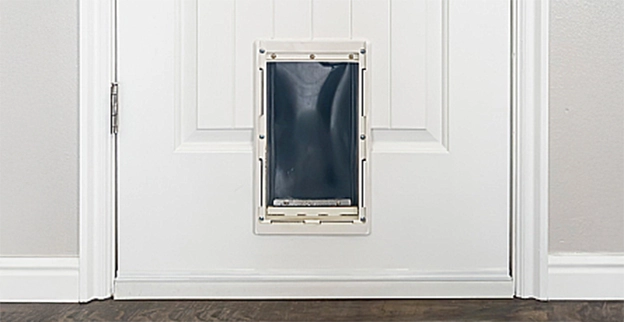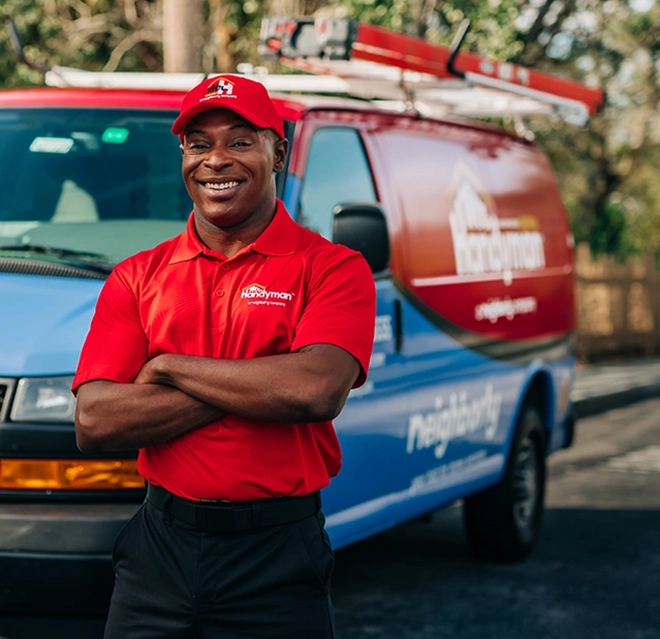When it comes to the wide range of services that we offer at Mr. Handyman, one of our more niche but popular services is Wheaton pet door installations. When looking at pet door options, it can get overwhelming quickly. But with our handyman professionals at your disposal, we'll get you set up with the best option for both you and your best friend.
Size and Placement Options for a Wheaton Pet Door Installation
Your furry friends come in all different shapes and sizes and so too must their doors. It can be tricky to handle a Wheaton pet door installation as a DIY project, but with the handyman professionals from Mr. Handyman, we'll help you find the perfect fit for both your pet and your home.
When you think of a pet door, you probably think of traditional doggy doors or a cat flap. But there are a myriad of options available on the market today. The first step we take to determine what pet door option will work best for you is to take accurate measurements of your pet. Because if you have a Great Dane, the doggy door for it is going to be much bigger than one for a house cat.
The next step is to determine which type of pet flap or door you're looking to have installed. There are a variety of doors, with each coming with its own set of pros and cons. Our handyman professionals will work with you, helping you decide on which type of pet flap or door will work best for your home and for your pet's needs.
Lastly, you need to pick a location to install the pet flap or door. There's a certain amount of knowledge and expertise that goes into a Wheaton pet door installation, and you don't want to go cutting a hole for a pet flap in your door or wall until you're certain that you have all the information. By working with our true professionals, we'll help determine the best location for your Wheaton pet door installation based on several factors. These include the design of your home, the size and style of the pet door, and where you want the pet door to lead.
Wheaton Pet Door Installation: What to Consider
Having a Wheaton pet door installation is all about convenience. However, you have to carefully consider several factors when looking at installing a pet door in your home. Listed below are factors and features to consider when looking at having a professional Wheaton pet door installation.
Size
The first consideration is the size of your pet. You want to ensure that the pet door frame can easily accommodate your furry friend. Take accurate measurements of your pet from the top of your pet's shoulders to the ground and between the widest points of their shoulders. Given that pets will crouch or bend over to enter smaller spaces, you don't need to measure above the head.
If you have more than one pet that will be using the door, take the measurements from the larger pet. If you have concerns or need help with attention to detail, your local handyman will be able to help.
Living Arrangements
Installing a pet door can be a very permanent change to your home. If you're renting, you'll likely want to look into more temporary solutions than if you're a homeowner. Still, you'll want to consider your home's style and how you live, given that a Wheaton pet door installation often involves cutting into a wall or door.
Safety
Pet doors are often an invitation to unwanted intruders. From potential burglars to insects to wild animals, you want to consider where you install your pet door. You should never install a pet door near door knobs or other important fixtures. Before you schedule a Wheaton pet door installation, address the security concerns you might have with a home security expert.
It's also important that you consider children if you have them. Children will be quite tempted to crawl through a pet door, especially if they're small enough to fit (and even if they aren't, they'll still try). While you might think that a garage door is an ideal place for your Wheaton pet door installation, you should probably avoid that if you have children.
Noise
Depending on the pet door you choose, it might make more noise than others. Doors that make a loud clapping noise, for instance, might startle your pet. Even some automated pet doors can produce noises that might startle or annoy your pet. If you have any noise concerns, consult with one of our true professionals for recommendations and suggestions.

